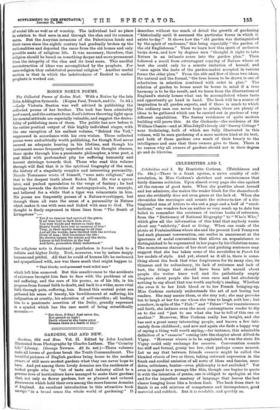CELEBR111.0 AND I.
Celebrities and I By Henriette Corkran. (Hute.hinson and Co. 16s.)—There is a frank egoism, a naive crudity of self- revelation, in Miss Corkran's sketches and reminiscences that fairly disarms criticism. Upon almost every page she sins against all the canons of good taste. When she prattles about herself and her admirers, she makes the reader blush for the shamefaced- ness she evidently does not even guess at the lack of. When she chronicles the marriages and counts the sisters-in-law of a dis- tinguished man of letters to eke out a page and a half of " recol- lections," one wonders how an author so very much up to date has failed to remember the existence of various books of reference, from the "Dictionary of National Biography" to "Who's Who," which give all the information of this kind that anybody wants about any "celebrity," dead or living. When one reads of the picnic at Fontainebleau where she and the present Lord Tennyson had such pleasant conversation, one smiles in amazement at the ignorance of social conventions that allows an acquaintance so distinguished to be represented in her pages by his Christian name. The monotonous staccato of her short and gushing sentences may suggest that she has taken some of the novelettes in Punch for her models of style. And yet, absurd as it all is, there is some- thing about the book that wins forgiveness for its many sins, its thinness and its redundancy, its lack of reticence and lack of tact, the things that should have been left unsaid about people the writer knew well and the pathetically empty chapters about people she had seen once and had absolutely nothing to say about that was worth anybody's reading. Whether she owes it to her Irish blood or to her French bringing-up, Miss Corkran certainly understands the art of not boring her readers. She may amuse them, or she may not; she may provoke ten to laugh at her for one whom she wins to laugh with her; but somehow, in spite of the " Pish !" and " Pshaw ! "her reminiscences call forth, she induces even the most contemptuous reader to dip on to the end "just to see what she has to tell of this one or another." Moreover, Miss Corkran really has insight, and she has met a great many interesting people, and known a few inti- mately from childhood ; and now and again she finds a happy way of saying a thing well worth saying,—for instance, this admirable definition of a "causerie" coming into the chapter about Alfred de Vigny. "However reverie is to be explained, it was the state De Vigny could only exchange for causerie. Conversation sounds too stiff and formal, gossip too low, chat perhaps comes nearest. Let us say that between friends causerie might be called the blended reverie of two or three, taking outward expression in the frank and cordial emission of all sorts of ideas and fancies, anec- dotes, criticisms, banter—even philosophy is not excluded." Yet even in regard to a passage like this, though one begins to quote it with the intention of praise, one is obliged to apologise at the end for the imperfect mastery of language that leaves the last clause banging loose like a broken limb. The book from start to finish is an odd mixture of competence and incompetence, good material and rubbish. But it is readable, and quickly so.






















































 Previous page
Previous page